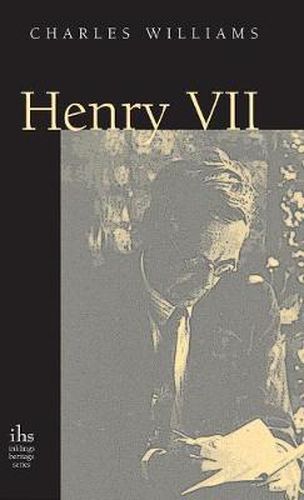Readings Newsletter
Become a Readings Member to make your shopping experience even easier.
Sign in or sign up for free!
You’re not far away from qualifying for FREE standard shipping within Australia
You’ve qualified for FREE standard shipping within Australia
The cart is loading…






This title is printed to order. This book may have been self-published. If so, we cannot guarantee the quality of the content. In the main most books will have gone through the editing process however some may not. We therefore suggest that you be aware of this before ordering this book. If in doubt check either the author or publisher’s details as we are unable to accept any returns unless they are faulty. Please contact us if you have any questions.
Henry VII is less spectacular than his descendants, but not less interesting or even exciting. The first of the Tudors has been less written about than any (except Edward VI). He supplanted a dynasty and subordinated an aristocracy; he collected a treasure and created a fleet. But he created also the engine of monarchy. He did this because his desires were never at odds with his intentions: he possessed an equilibrium greater than any other Tudor-even Elizabeth. That fixed equilibrium of his mind released a very high industry and decision. In his later life his methods a little overcame him; his suspicion, his caution, his acquisitiveness escaped control. It was then that by certain general measures and especially by one little particular act he prepared the way for the destruction of that engine of monarchy he had created. The reign of Henry VII was the seed of the future, but it was already worm-eaten. Charles Williams was one of the finest-not to mention one of the most unusual-theologians of the twentieth century. His mysticism is palpable-the unseen world interpenetrates ours at every point, and spiritual exchange occurs all the time, unseen and largely unlooked for. His novels are legend, and as a member of the Inklings, he contributed to the mythopoetic revival in contemporary culture.
$9.00 standard shipping within Australia
FREE standard shipping within Australia for orders over $100.00
Express & International shipping calculated at checkout
This title is printed to order. This book may have been self-published. If so, we cannot guarantee the quality of the content. In the main most books will have gone through the editing process however some may not. We therefore suggest that you be aware of this before ordering this book. If in doubt check either the author or publisher’s details as we are unable to accept any returns unless they are faulty. Please contact us if you have any questions.
Henry VII is less spectacular than his descendants, but not less interesting or even exciting. The first of the Tudors has been less written about than any (except Edward VI). He supplanted a dynasty and subordinated an aristocracy; he collected a treasure and created a fleet. But he created also the engine of monarchy. He did this because his desires were never at odds with his intentions: he possessed an equilibrium greater than any other Tudor-even Elizabeth. That fixed equilibrium of his mind released a very high industry and decision. In his later life his methods a little overcame him; his suspicion, his caution, his acquisitiveness escaped control. It was then that by certain general measures and especially by one little particular act he prepared the way for the destruction of that engine of monarchy he had created. The reign of Henry VII was the seed of the future, but it was already worm-eaten. Charles Williams was one of the finest-not to mention one of the most unusual-theologians of the twentieth century. His mysticism is palpable-the unseen world interpenetrates ours at every point, and spiritual exchange occurs all the time, unseen and largely unlooked for. His novels are legend, and as a member of the Inklings, he contributed to the mythopoetic revival in contemporary culture.